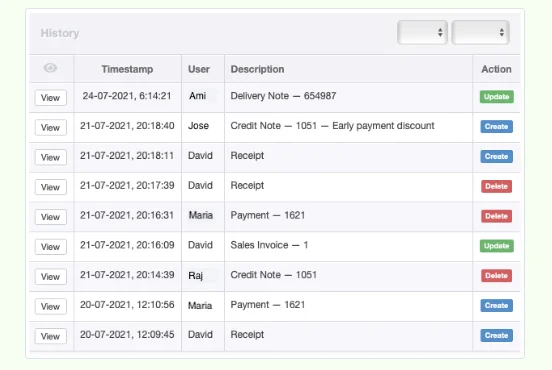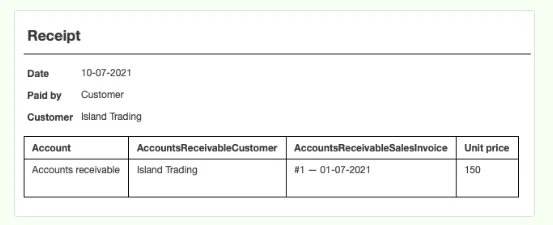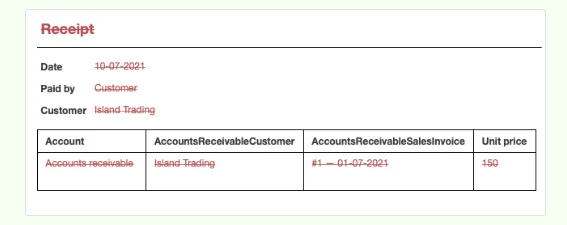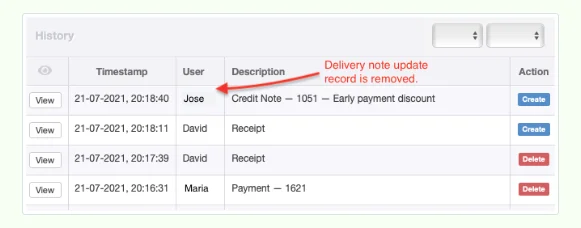History
Manager Setup > Summary > Summary Tasks

History
Every business in Manager has a History file that allows you to audit data entries, updates, deletions, and batch operations. The History file is unique for each business you create in Manager. When you backup a business, the History file is, by default, part of the backup. (You can, however, exclude it from a backup.)
Note
Sending of emails is not recorded in the History file, because it does not affect accounting records. Emails can be reviewed separately.
Sending of emails is not recorded in the History file, because it does not affect accounting records. Emails can be reviewed separately.
Review the History file
To review history, click the History button near the top of the Manager window:

A list of actions appears, with:
- Timestamp for the action
- User who took the action
- Description of the action
- Action category
Example
The first few records in Northwind Traders’ History file are shown below:
The first few records in Northwind Traders’ History file are shown below:

View individual actions
To see exactly what a user did, click View for an action.
Example
On July 20, 2021, at 12:09:45, a user named David created a receipt:
On July 20, 2021, at 12:09:45, a user named David created a receipt:

David mistakenly entered a unit price on the receipt of 150. The next day, David noticed his mistake and deleted the receipt. That action was recorded also, on July 21, 2020, at 20:17:39, and can be viewed in the History file:

David immediately created a new receipt for the correct amount. Alternatively, the existing transaction could have been edited. Whichever approach had been taken, either of those transactions would also be recorded in the History file.
Undo actions
There is another method for reversing actions, the Undo button:

The Undo button is somewhat like a Back button in a web browser, or the Undo function in a word processing program, with a very important difference. Manager’s Undo button does not operate in reverse order of the original actions. Actions can be undone in any order.
Example
Notice the delivery note update on the first line of the History file. Ami originally created this delivery note in preparation for a weekly delivery to a customer. On July 24, she updated it because the customer called to request additional items. But when the delivery driver arrived, the customer said she had changed her mind and would only take delivery of the items originally ordered. When Ami learns this, she goes to the History file, views the update record, and clicks the Undo button. Her update is reversed and removed from the history file:
Notice the delivery note update on the first line of the History file. Ami originally created this delivery note in preparation for a weekly delivery to a customer. On July 24, she updated it because the customer called to request additional items. But when the delivery driver arrived, the customer said she had changed her mind and would only take delivery of the items originally ordered. When Ami learns this, she goes to the History file, views the update record, and clicks the Undo button. Her update is reversed and removed from the history file:

Caution
Consequences of using the Undo button are sometimes difficult to foresee. This is especially true when transactions reference one another, such as when a fixed asset is created, a purchase invoice records its purchase cost, and a payment records payoff of the purchase invoice. Always make a backup of your business before undoing transactions from the History file, because the Undo function itself cannot be reversed.
Consequences of using the Undo button are sometimes difficult to foresee. This is especially true when transactions reference one another, such as when a fixed asset is created, a purchase invoice records its purchase cost, and a payment records payoff of the purchase invoice. Always make a backup of your business before undoing transactions from the History file, because the Undo function itself cannot be reversed.
Review individual transaction history
Often, it is useful to know exactly what has happened to a specific transaction in Manager. When was it initially created; how has it been edited; who was responsible for various actions; and so forth? To see the history of a specific transaction, click the History button in the lower right corner of the screen while viewing the transaction:

Note
The transaction History button is smaller than the main History button for the business at the top right corner. Its label is also in plain, gray text rather than bold, black text.
The transaction History button is smaller than the main History button for the business at the top right corner. Its label is also in plain, gray text rather than bold, black text.
Example
The transaction history for the replacement receipt David created on July 21 is very brief:
The transaction history for the replacement receipt David created on July 21 is very brief:

Filter by user
The History file can be filtered for a specific user’s actions. This might be useful for monitoring performance of new employees. Or it could be helpful in identifying who is responsible for malicious behavior. To filter by user, select a user name in the dropdown box closest to the History file header (blue arrow):

Example
Brilliant Industries has three users who have created, updated, or deleted accounting transactions in its records:

Currently, however, the checkmark indicates no user filter has been applied.
Filter by action category
To display only actions of one category, select the desired category from the other dropdown box in the History file header (red arrow):

The three category options are:

